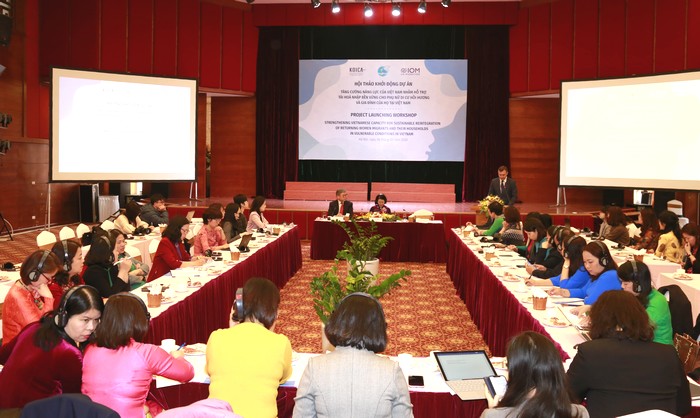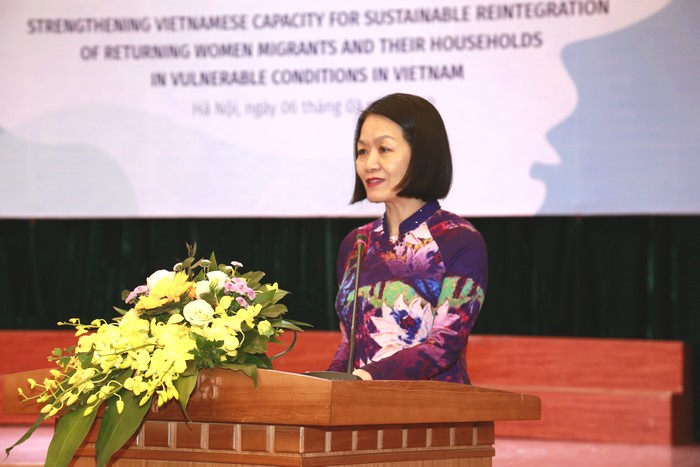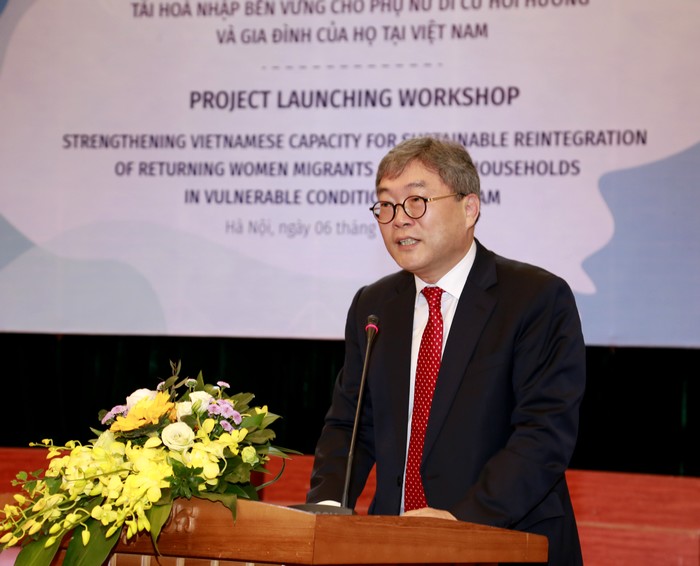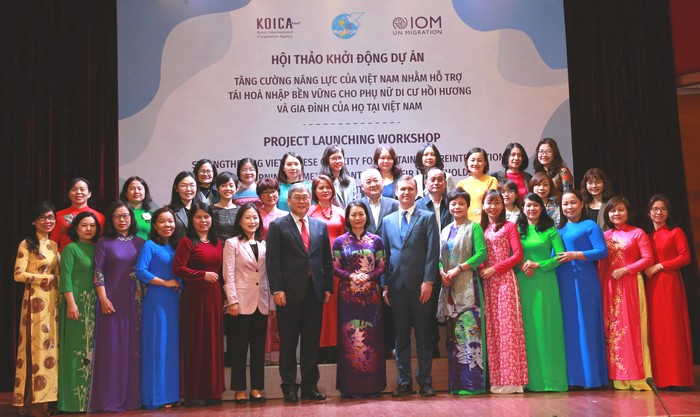“One Stop Support Office” to support sustainable reintegration of returning female migrants
01/07/2020
Establishing and operating “One Stop Support Office” (OSSO) to support sustainable reintegration of repatriating women and their families is an important goal of the Project “Strengthening Vietnamese Capacity for Sustainable Reintegration of Returning Migrants Women and their Households in Vietnam” implemented by the Vietnam Women's Union (VWU) with the sponsorship of Korea International Cooperation Agency (KOICA) through the International Organization for Migration (IOM) in Vietnam.
 VWU’s Vice President Mrs. Bui Thi Hoa, KOICA’s Country Director Cho Han Deog (left), IOM Director Brett Dickson (right) chair the project launching workshop.
VWU’s Vice President Mrs. Bui Thi Hoa, KOICA’s Country Director Cho Han Deog (left), IOM Director Brett Dickson (right) chair the project launching workshop.
Vietnamese people migrate abroad for many purposes among which more and more women migrate for marriage purpose. In 2018, women accounted for 85% of the 16,223 marriages involving foreigners in Vietnam.
The Republic of Korea is one of the top destination countries for Vietnamese migrating brides. In the last 5 years, the number of Vietnamese brides in Korea has seen an increase (from 4,651 cases in 2015 to 6,338 cases in 2018). In 2018, Vietnamese women make up the largest group of foreign brides married to Korean citizens, accounting for 38% of the 16,608 foreign-based marriages in Korea, in which the average divorce rate is 30% (categorized as the group of citizenship with the second highest divorce rate), resulting in 410 children affected each year.

The project launching workshop in Hanoi on March 6, 2020
After returning to Vietnam, many women migrants face difficulties in integrating into the community. About half of the repatriated women reside in a place other than their home locality. Without job skills and employment, many of them are subject to stigma and discrimination by family and society. Having little access to legal and psychological advice in solving their own and their children’s problems, they might become poorer and more vulnerable if proper intervention and support is not provided.
In addition, many returning female migrants have not completed the divorce procedure due to the lack of information, high costs and complicated procedures in the two countries. In many cases, their children have not yet a birth certificate or their nationality not has been determined. Seventy percent of children of female migrant women are unregistered and have unclear legal status of residence.
Therefore, one of the main activities of the project is to pilot the establishment and operation of OSSOs in 5 provinces and cities of Hà Nội, Hậu Giang, Cần Thơ, Hải Phòng, Hải Dương to provide advice and support the returning women migrants.

VWU’s Vice President Mrs. Bui Thi Hoa delivers remarks at the workshop
At the project launching workshop held in Hanoi on March 6, 2020, the VWU’s Vice President Mrs. Bui Thi Hoa affirmed the project is highly meaningful and practical for the protection of the rights of returning female migrants and their children in the context of increasing internal and international migration with many issues to be addressed at the national and inter-national level.

Cho Han Deog, Country Director of KOICA Vietnam Office
According to Mr. Cho Han Deog, Country Director of KOICA Vietnam, migrant marriage does not always bring good results, especially for women when they face obstacles in terms of language and cultural barriers in the new community which are sometimes insurmountable. As such, when they want to return home to their beloved ones, the support from the local authorities is very important. The VWU with its wide network down to the grassroots level can lay a solid foundation for the Project to provide better support to returning female migrants.
At the launching workshop, representatives of the WUs of project’s provinces and cities, ministries, agencies and several international organizations in Vietnam highly appreciated the importance of the project and expressed their strong commitments towards the project.

Participants express their commitments towards the project
Translated by Int’l Relations Department